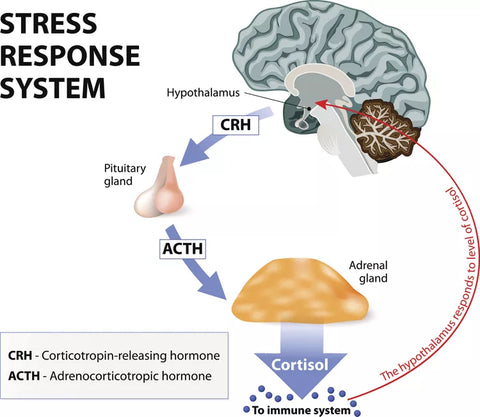
Understanding the stress response is vital for addressing adrenal fatigue symptoms. The adrenal glands play a large role in regulating our endocrine system and reproductive hormones. In this article, we will delve deeper into adrenal function and how you can reverse adrenal fatigue naturally through lifestyle and dietary changes, alongside nutrients and herbs that improve adrenal health. Optimal adrenal health is important to prepare for a healthy pregnancy.
Key Takeaways:
- Adrenal glands play a role in multiple body functions, including your reproductive function.
- HPA axis can be impacted by chronic stress which can lead to hormonal imbalances.
- Adequate nutrition is needed for adrenal health.
- Herbal medicines can support your HPA axis and healthy hormone production for conception.
The Adrenal Glands
The adrenal glands are made up of two sections – the adrenal medulla and the adrenal cortex. We have two adrenal glands; they are located on top of both kidneys. Adrenal glands produce hormones that help regulate our metabolism, immune system, blood pressure, reproductive hormones, and stress response.

The adrenal medulla is responsible for producing stress hormones epinephrine and norepinephrine which play a role in acute responses to stress. They increase heart rate, blood pressure and metabolism and are involved in our ‘flight or fight’ response. High levels of these stress hormones can lead to symptoms of nausea, high blood pressure, tremors, and weight loss.
The adrenal cortex is responsible for producing aldosterone which is a hormone involved in water and mineral balance in the body. The adrenal cortex produces corticosteroids (cortisol and androgens) and adrenal androgens such as DHEA. DHEA is needed to produce our sex hormones, oestrogen and testosterone.
The HPA Axis
The adrenal glands play a large role in our HPA axis. The hypothalamic-pituitary-adrenal axis (HPA axis) is essentially the connection between the brain and the adrenal glands which regulates our stress response.
Short-term activation of the HPA axis is beneficial for creating a quick response to stressors and creates a ‘fight or flight’ response. When we are in this response our cognition and energy is enhanced alongside our immune system being inhibited so we can ‘run away’ from the danger effectively.
This response is helpful in emergency situations and increases our performance short term, however a lot of us are in this response too often or for long periods of time which can have negative impacts on our health and hormones.
Research has shown that constant HPA axis activation can negatively impact our immune system, cardiovascular health, metabolic health, and nervous system. This can lead to many chronic health conditions such as autoimmune disease, cardiovascular disease, weight gain, diabetes, reproductive conditions, and mental illness.

Symptoms of Adrenal Fatigue
The term ‘adrenal fatigue’ is a functional description of a range of different clinical symptoms and presentations of chronic stress. Adrenal fatigue is not a medically recognised condition and research has not shown a clear explanation of burnout as such. However, research has shown that imbalances to the HPA axis, chronic stress and high or low cortisol levels can indeed cause different symptoms in people.
Suboptimal cortisol levels from chronic stress can contribute to symptoms relating to burnout. Some people develop chronic fatigue syndrome and exhaustion where an individual may struggle to have energy to complete normal day to day tasks and work. They may also have symptoms such as low blood pressure, fainting/feeling lightheaded, crave salt, nausea, loss of appetite, muscle weakness, low libido, and irregular menstrual cycles.
Alternatively, some people may display high cortisol levels from chronic stress which can contribute to symptoms such as weight gain (especially apple shaped), stretch marks, easy bruising, slow wound healing, acne, hair loss, headaches, anxiety, depression, insomnia, poor ability to conceive, high blood pressure and excessive sweating or flushing.
If you're struggling with poor sleep, you can reduce insomnia naturally and support your cortisol.
Adrenal health changes in menopause too, treat the symptoms of menopause naturally to optimise your adrenal health in menopause.
Adrenal Health & Hormones
The HPA axis impacts the hypothalamic-pituitary- ovarian axis (HPO axis). Chronic stress will impact reproductive hormone production which is important for a healthy reproductive system for conception and regular menstrual cycles.
This is because our body prioritises producing stress hormones such as cortisol via our HPA axis instead of prioritizing our HPO axis and reproductive hormones to create a baby. Our body essentially picks our own survival as it does not feel safe to reproduce.
Our adrenal glands produce DHEA-S which is a precursor hormone that is needed to produce reproductive hormones such as testosterone, progesterone, and oestrogen. These sex hormones are essential for healthy reproductive function.
Therefore, if you would like to prepare for a healthy pregnancy, optimising your adrenal health and reducing your stress levels is important. Studies have shown that adrenal insufficiency is associated with ovarian insufficiency.
How to Optimise Your Adrenal Health
Your diet can play a large role in your adrenal health. If you are burnt out, focusing on a nutrient-dense diet full of nourishment is important in your recovery from chronic stress.
Increasing portions of food, protein and healthy fats alongside not restricting food groups will help regulate your cortisol levels if your chronic stress has come from being in starvation mode from dieting/disordered eating. Eating disorders and low food intake has been associated with poor conception. Eating adequate protein and fats can help you boost your fertility through diet.
Lifestyle practices can also assist stress reduction and burnout. Yoga and meditation have been shown to reduce cortisol levels and reduce severity of chronic fatigue and stress.
Nutrients for Adrenal Function
The adrenal glands are one of the organs that store the highest amount of vitamin C within the body. Vitamin C is needed for adrenal gland function and the production of stress hormones. Zinc is important for healthy adrenal gland function and zinc deficiency has been associated with higher stress levels and anxiety. Magnesium plays a role in healthy adrenal gland function and reduces the impact of stress on the nervous system. Electrolytes such as sodium, potassium and calcium are also important for adrenal function too.
Herbal Medicine for Adrenal Health
Siberian ginseng has been shown to help regulate the HPA axis and support adrenal function to reduce symptoms of anxiety, fatigue, and low moods.
Bacopa has been shown to regulate the HPA axis, reduce low moods, reduce mild anxiety, and enhance cognitive function.
Withania reduces perceived stress and helps the body adapt to stress. Withania also supports thyroid health and function, which is important for hypothyroidism and its impact on fertility.
Licorice is an adrenal tonic that can help assist energy levels to reduce fatigue. However, herbalists often avoid prescribing it to people that are in high cortisol states as it can be overstimulating. Licorice should not be used in people with high blood pressure.
Rehmannia is another herb that supports adrenal health and function to reduce the effects of stress on the body. It also helps to reduce fatigue and protects the nervous system from stress.
Shatavari is used as a tonic for stress and burnout that particularly impacts the reproductive system for conception. Shatavari supports healthy oestrogen levels that can be depleted with burnout as well.
Tribulus leaf has been shown to increase DHEA production which is a precursor needed for the sex hormones testosterone and oestrogen for healthy libido and sexual function.
Summary
To summarise, healthy adrenal function and HPA axis regulation is important for healthy hormone production to prepare for a healthy pregnancy. A healthy diet can improve your adrenal health and cortisol regulation. Nutrients such as magnesium, vitamin C and zinc are required for adrenal health so increasing these nutrients can assist in reducing the risk of burnout. Herbal medicines can also be a great tool to improve your adrenal health alongside stress reduction.




